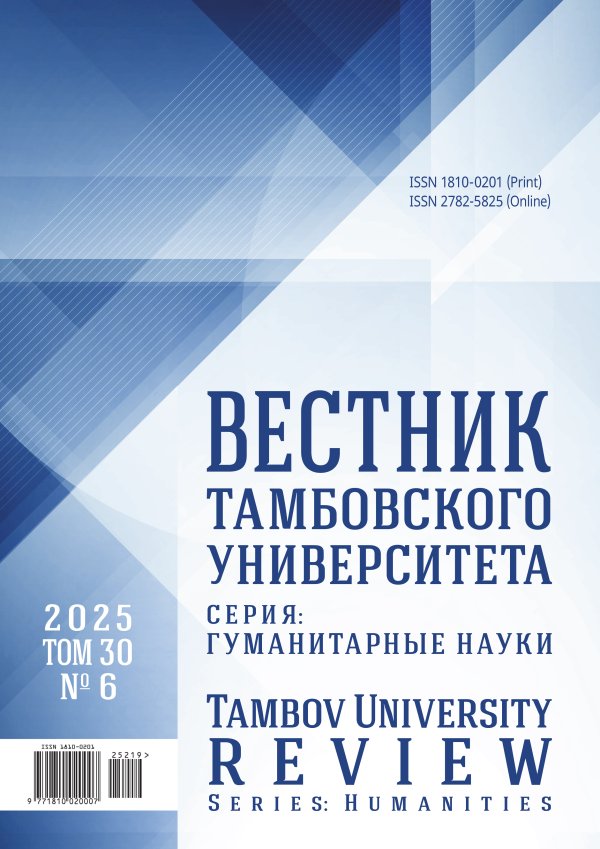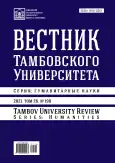Комплекс образовательных технологий формирования компетентности в области социально-проектной деятельности у студентов
- Авторы: Гарашкина Н.В.1, Дружинина А.А.2, Акопянц И.А.2
-
Учреждения:
- ОЧУВО «Московский инновационный университет»
- ФГБОУ ВО «Тамбовский государственный университет им. Г.Р. Державина»
- Выпуск: Том 26, № 190 (2021)
- Страницы: 90-97
- Раздел: ВОПРОСЫ СОЦИАЛЬНОЙ ПЕДАГОГИКИ И СОЦИАЛЬНОЙ РАБОТЫ
- URL: https://journal-vniispk.ru/1810-0201/article/view/298335
- DOI: https://doi.org/10.20310/1810-0201-2021-26-190-90-97
- ID: 298335
Цитировать
Полный текст
Аннотация
Рассмотрен комплекс образовательных технологий, улучшающих процесс формирования компетентности в области социально-проектной деятельности. Отмечено, что преподаватель становится навигатором, а студенты являются активными проектировщиками своей образовательной траектории, деятельными участниками образовательного процесса, а также создателями социальных проектов, гарантирующими решение значимых проблем человека и общества. Показана взаимосвязь внедрения социальных инноваций и формирования компетентности в социально-проектной деятельности, а также применяемых образовательных технологий. Рассмотрены различные понимания термина «образовательные технологии» в современных зарубежных исследованиях. На основе метода анализа исследовательских позиций дано понимание образовательных технологий как концептуального инструмента по улучшению образовательной практики. Проанализированы сущность и особенности организации наиболее результативных образовательных технологий формирования компонентов социально-проектной компетентности у студентов. Выделен комплекс и три группы образовательных технологий, влияющих на формирование компетентности в области социально-проектной деятельности у студентов: традиционные дидактические технологии (лекции, семинары и др.), интегральные дидактические технологии (кейсанализ, проектное обучение, портфолио и др.), инновационные дидактические технологии (перевернутое обучение, цифровые технологии и др.). Установлено, что именно комплексное внедрение образовательных технологий в программах бакалавриата и магистратуры социальной направленности позволяет качественно улучшать не только образовательную, но и позитивно изменять социальную практику, влиять на их совместный результат.
Об авторах
Н. В. Гарашкина
ОЧУВО «Московский инновационный университет»
Email: nagaraisr@mail.ru
ORCID iD: 0000-0001-9212-4235
доктор педагогических наук, профессор, зам. зав. кафедрой юридических дисциплин
119017, Российская Федерация, г. Москва, ул. Малая Ордынка, 7А. А. Дружинина
ФГБОУ ВО «Тамбовский государственный университет им. Г.Р. Державина»
Email: drugininaan@yandex.ru
ORCID iD: 0000-0002-1146-0374
кандидат педагогических наук, доцент, доцент кафедры теории и методики дошкольного и начального образования
392000, Российская Федерация, г. Тамбов, ул. Интернациональная, 33И. А. Акопянц
ФГБОУ ВО «Тамбовский государственный университет им. Г.Р. Державина»
Автор, ответственный за переписку.
Email: shi15direktor@rambler.ru
ORCID iD: 0000-0001-9069-6715
аспирант, кафедра социальной работы
33 Internatsionalnaya St., Tambov 392000, Russian FederationСписок литературы
- Берулава Г.А., Берулава М.Н. Методологические основы новой сетевой теории развития личности // Гуманизация образования. 2012. № 1. С. 8-23.
- Hsu Y.C., Hung J.L., Ching Y.H. Trends of educational technology research: More than a decade of international research in six SSCI-indexed refereed journals // Educational Technology Research and Development. 2013. № 61 (4). Р. 685-705.
- Ely D.P. The Changing Role of the Audiovisual Process in Education: A Definition and a Glossary of Related Terms. Washington, 1963.
- Richey R.C., Silber K.H., Ely D.P. Reflections on the 2008 AECT Definitions of the Field // TechTrends. 2008. № 52 (1). Р. 24-25.
- Kurt S. Educational technology: an overview. URL: https://educationaltechnology.net/educationaltechnology-an-overview/ (accessed: 03.08.2019).
- Гарашкина Н.В., Дружинина А.А. Социально-проектная деятельность в подготовке бакалавров дошкольного образования: развивающий потенциал и технологии реализации // Добровольческие инициативы в социальной сфере: сб. ст. науч.-практ. конф. / под общ. ред. Т.Г. Деревягиной. Тамбов, 2019. С. 27-31.
- Усачева О.В. Значимость организационно-управленческой компетенции в системе подготовки учителя к осуществлению организационно-управленческой деятельности // Язык, культура, познание, коммуникация. Тамбов, 2015. С. 170-175.
- Киселeва М.Н. Оценка персонала. СПб.: Питер, 2015. 256 с.
- Велединская С.Б., Дорофеева М.Ю. Смешанное обучение: технология проектирования учебного процесса // Открытое и дистанционное образование. 2015. № 2 (58). С. 12-19.
- Челышкова М.Б., Звонников В.И., Давыдова О.В. Оценивание компетенций в образовании. М.: ГУУ, 2011. 229 с.
- Баранов И.Н., Кислова А.Р., Радаев И.В., Тарасов С.А., Юрченков В.И. Обучение в новой нормальности: вызовы и ответы. Аналитическй отчет. М.: АНО ДПО «Корпоративный университет Сбербанка», 2020. 71 с.
Дополнительные файлы









